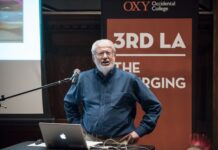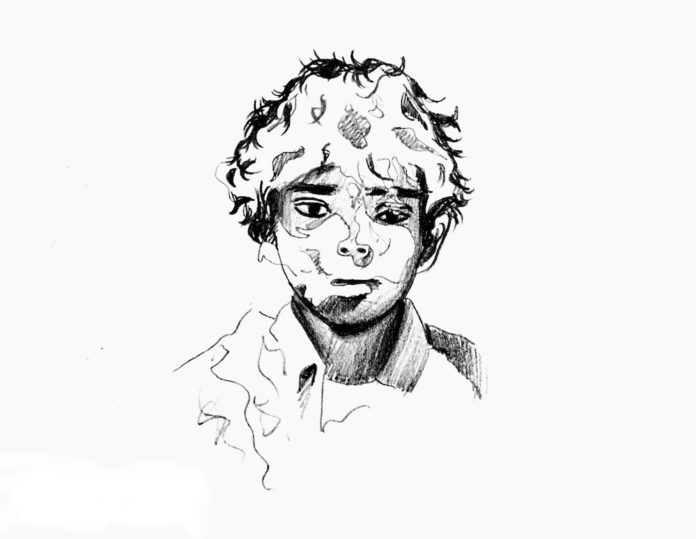Director Alma Har’el’s debut feature film “Honey Boy” was released by Amazon Studios Nov 8. The coming-of-age plot follows 22-year-old Otis as he looks back on his upbringing as a child actor. Showbiz success creates tension between the boy and his father until their irregular relationship turns hostile. The autobiographical screenplay from 33-year-old actor Shia LaBeouf is a recollection of his personal experience.
LaBeouf became known in the early 2000s for his role on the Disney television show “Even Stevens.” His notoriety continued through the last two decades after starring in films like “Holes,” “Disturbia” and “Transformers.” More recently, his public persona is influenced by his irregular work as a performance artist. In 2014, he arrived at the Berlin International Film Festival wearing a paper bag over his head that read “I am not famous anymore.” “Honey Boy” is the latest chapter in his bizarre yet impressive career. By literally and figuratively placing himself inside the story, LaBeouf imposes layers of self-consciousness onto this small art film. Instead of following a traditional arc, Har’el presents a string of anecdotes that reinforces general themes. He crafts an unapologetically personal project in which one man reckons with forgiveness and responsibility.
The on-screen events in “Honey Boy” mirror LaBeouf’s material process of writing the screenplay. In 2017, he was ordered to attend a drug rehab facility, where he was eventually diagnosed with PTSD. Otis, whose character represents LaBeouf, also attends a rehab facility after being arrested for drunk driving. The Hollywood Reporter wrote that during the movie’s Sundance Film Festival premiere, he revealed the circumstances that both inspired and produced the film.
“Prior to this, my father and me hadn’t spoken in six, seven years. We’re talking now,” LaBeouf said.
The script for “Honey Boy” is a gesture toward this reconciliation. Otis’ trauma is activated by memory, and through his treatment sessions, he records each flashback. His ultimate decision to make a film about his complicated father is a meta portrayal of LaBeouf’s real catharsis. The daily schedule of the fictional facility lines Otis’ path with inadvertent reminders that trigger his memory. An activity involving swimming takes his mind back to the local pool in his depressing motel complex.
By frequently splicing between time periods, Har’el gives the plot a loose and almost surreal structure. The opening sequence establishes this style effectively. It begins with thunderous blasts and cranking machines that call back to LaBeouf’s starring role in Michael Bay’s “Transformers” series. This is simply part of Otis’ latest acting job, and his stunt harness exposes the fantasy of it all. A montage of confusing events crashes onto the screen with quick and forceful editing. It is a kind of cinematic explosion that introduces the different parts of self which LaBeouf goes on to explore. The film doesn’t produce another scene at this pace, but this harsh introduction pays off and sets the tone for unique quirks to follow.
LaBeouf’s performance as his reckless father is an act of personal courage. His mangled mullet and colloquial speech put forth the image of a man who has lost his way. As a character and father, James Lort lives a cluttered life full of cigarettes and retro stories. His mood swings are extreme and sometimes unprovoked. He cannot control himself in his meeting with Otis’ stepfather, and he pushes the man into a pool. In more tempered moments, he shows genuine care for his son, but it just can’t seem to last. LaBeouf crafts an ingenious portrait of his father as both charismatic and detestable. His obnoxious outbursts are incredibly selfish, but they’re also creative and humorous. This dynamic between father and son carries a unique edge that further complicates their relationship. Otis confronts his father and reminds him that work as a child actor pays their bills. James is financially dependent on his son because no one else will hire him based on his status as a convicted sex offender. It is clearly a nontraditional situation, and it strains their connection as a family.
“Honey Boy’s” floating plot and aesthetic features might give off the impression that this film is simply hipster kitsch. Still, the final scene is an odd but touching act of forgiveness. Reality and fiction overlap when 22-year-old Otis tells his father that he is going to make a movie about him. James replies by insisting that he “looks good.” In this moment, LaBeouf, as a writer and actor, is announcing his intention and actually performing it at the same time. These layers of self-conscious dialogue and circumstance are enough to leave you dizzy. Despite its oddball nature, this gesture gives the film its heart. By releasing such a personal project, LaBeouf shines light on the shadow of his past. It is a bold artistic challenge, but this strange cast of characters pulls it off to produce something unique.
![]()




































